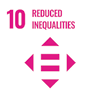Extreme weather driven by climate change increasingly endangers natural systems and human societies and is a serious global threat. A primary global challenge today is to achieve the net-zero transition for all economic production by 2050, as agreed in the Paris Accord to limit global warming to less catastrophic levels. But it is still unclear how such a transition will influence inequality and what must be done to ensure a just transition, especially for the Global South countries least responsible for historical global greenhouse gas emissions.
In this project, we explore the causal impacts of climate shocks on labour market outcomes and the adaptive responses of individuals. For example, prolonged droughts in sub-Saharan Africa severely reduce crop yields, resulting in food insecurity and the displacement of agricultural workers. This displacement not only increases unemployment but also compels workers to migrate, enter informal sectors, or transition to sectors characterized by lower wages and poor working conditions, thereby exacerbating poverty.
The unequal distribution of climate impacts further entrenches socioeconomic inequalities. Marginalized groups, including women, indigenous communities, and low-income households, often face more restricted access to resources and limited adaptive capacities to manage climate-induced disruptions. We examine the subsequent impact on national and global economic performance, and the economic and employment losses in acutely vulnerable sectors, such as agriculture, forestry, and fishing.
We also explore how the shift towards a green economy promises job creation in some sectors, but requires sustained investments in education, skills training, and infrastructure which many low- and middle-income countries (LMICs) may struggle to afford. Will the benefits of a green transition be equitably distributed, or will they be captured by countries with a head start? This project seeks to understand the distribution of gains and losses during energy transitions and to address the practical challenges policymakers face in ensuring a 'just energy transition'.
Key questions
- What are the impacts of climate shocks on poverty and inequality in LMICs, and how can we develop effective mitigation and adaptation strategies?
- How prepared are labour markets in LMICs for the transition to a greener economy, and who are the potential winners and losers?
- What are the existing mechanisms (domestic and international transfers, migration, social protection, etc.) used by households in LMICs to cope with climate change?
Watch this space
All the activities, publications, events, opportunities to engage, and other outputs of this project will be here!

 Join the network
Join the network




